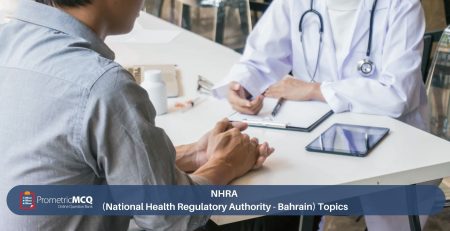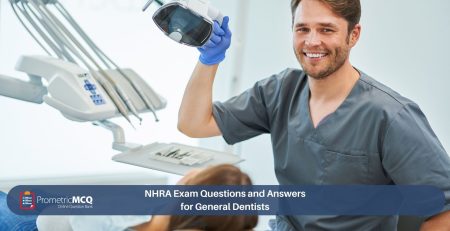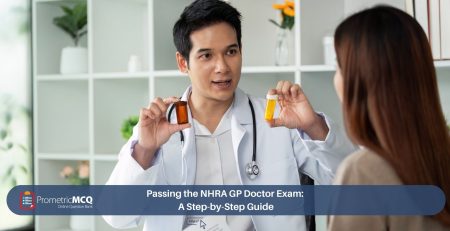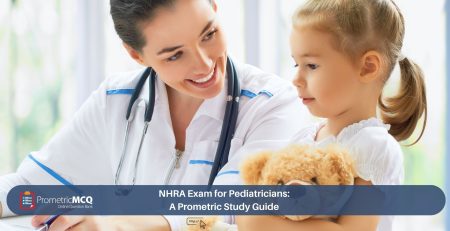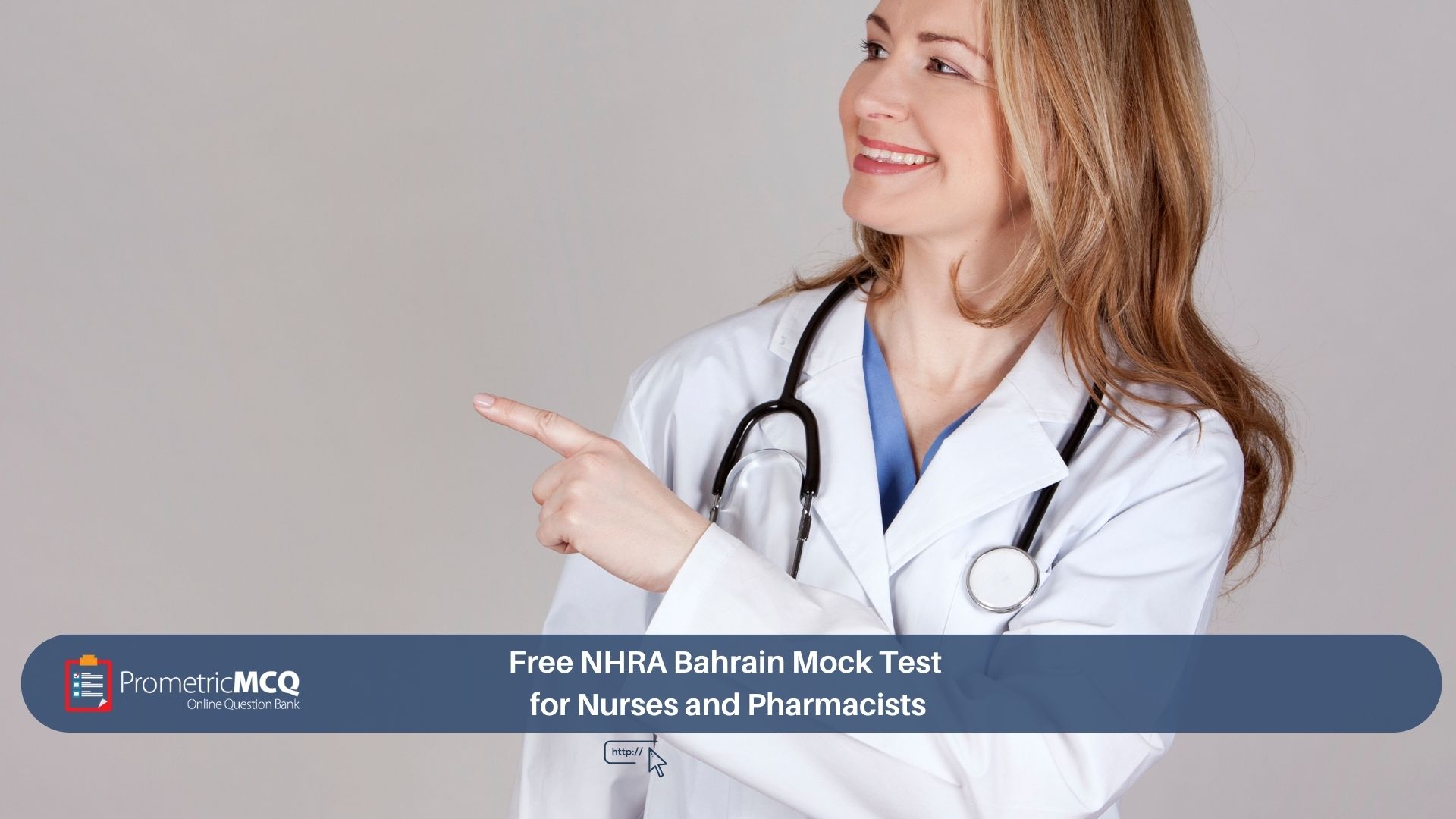
Free NHRA Bahrain Mock Test for Nurses and Pharmacists
fatima@prometricmcq.com2025-09-18T19:29:54+00:00Table of Contents
ToggleFree NHRA Bahrain Mock Test for Nurses and Pharmacists (2025)
For nurses and pharmacists worldwide, the Kingdom of Bahrain represents a pinnacle of professional opportunity. Its advanced healthcare infrastructure and commitment to high standards of patient care make it a prime destination for ambitious practitioners. The key to unlocking this career path is the National Health Regulatory Authority (NHRA) licensure exam. This is not just a test of knowledge, but a comprehensive assessment of your clinical reasoning, problem-solving skills, and readiness to practice safely and effectively. In this high-stakes environment, strategic preparation is not just recommended—it’s essential.
Among all the study tools available, one stands out as the most powerful and effective: the mock test. A high-quality mock test is a full dress rehearsal for the main event. It simulates the pressure, timing, and question styles of the real NHRA Prometric exam, providing an unparalleled diagnostic tool to assess your readiness. It moves you from passive learning to active problem-solving, which is the cornerstone of exam success.
This ultimate 2025 guide has been designed to be your first, most critical step in this active preparation phase. We have compiled a comprehensive free mock test featuring high-yield, exam-style Multiple-Choice Questions (MCQs) specifically for nurses and pharmacists. Each question is accompanied by a detailed rationale that not only explains the correct answer but also deconstructs the incorrect options. We will also provide strategies for analyzing your performance and a 10-point FAQ to clarify every step of your journey.
Key Takeaways for Your NHRA Preparation
- Mock Tests are Diagnostic Tools: Use them to identify your weak areas, not just to see a score. Analyze every question you get wrong.
- Simulate Real Conditions: Take mock tests under timed conditions without interruptions to build mental stamina and perfect your pacing.
- Rationales are Gold: Spend more time reading the rationales than answering the questions. Understanding the “why” is how you truly learn.
- Focus on High-Yield Topics: The questions in this guide are weighted towards the most frequently tested topics for nurses (prioritization, safety) and pharmacists (clinical cases, calculations).
- Consistency is Key: Incorporate regular mock tests and MCQ practice into your study schedule to see continuous improvement.
Why a Mock Test is Your Most Powerful Study Weapon
Reading textbooks and watching lectures builds your knowledge base, but it doesn’t prepare you for the unique challenges of a standardized exam. This is where mock tests become indispensable. A well-structured mock test, as part of your Bahrain NHRA exam preparation, provides several key advantages:
- Familiarity with the Exam Pattern: It acquaints you with the structure of 150 questions in 3 hours, the style of case-based MCQs, and the on-screen interface of the Prometric exam.
- Mastering Time Management: It forces you to practice answering questions at the required pace of approximately 1 minute and 12 seconds per question, a skill that is crucial for completing the exam.
- Identifying Knowledge Gaps: A mock test provides an honest assessment of your strengths and weaknesses. A low score in a particular area (e.g., Cardiology for nurses, or Infectious Diseases for pharmacists) tells you exactly where to focus your revision.
- Reducing Exam Anxiety: The more you simulate the exam experience, the more comfortable and less anxious you will be on the actual test day. Familiarity breeds confidence.
- Developing Critical Thinking Skills: Mock tests train your brain to think like the examiners, helping you to quickly analyze clinical vignettes, eliminate incorrect options, and identify the single best answer.
Free NHRA Mock Test for Nurses
This section contains 10 high-yield MCQs designed to mirror the style and difficulty of the NHRA Nursing Exam. Focus on clinical reasoning and patient safety. For even more questions, a dedicated nursing MCQ bank is highly recommended.
Question 1: Prioritization
A nurse on a medical-surgical unit receives the morning report. Which of the following patients should the nurse assess first?
- A patient with pneumonia who has a temperature of 38.5°C and a productive cough.
- A patient with type 2 diabetes who has a pre-breakfast blood glucose level of 180 mg/dL (10 mmol/L).
- A patient who had a total knee replacement yesterday and is complaining of 6/10 pain.
- A patient with asthma who used their rescue inhaler 15 minutes ago and is now reporting shortness of breath and has an oxygen saturation of 89%.
Correct Answer: D
Rationale: This is an Airway, Breathing, Circulation (ABC) priority question. The patient with asthma is experiencing a breathing problem that is not responding to initial treatment. An oxygen saturation of 89% indicates significant hypoxia and respiratory distress, which is a life-threatening situation requiring immediate intervention.
Why other options are incorrect:
A: A fever and productive cough are expected findings for pneumonia. This patient needs assessment but is not in immediate danger.
B: While elevated, a blood glucose of 180 mg/dL is not a critical value requiring immediate action before other patients.
C: A pain level of 6/10 is expected after major surgery and needs to be managed, but it is not as life-threatening as respiratory compromise.
Question 2: Pharmacology
A nurse is preparing to administer a dose of Furosemide (a loop diuretic) to a patient with heart failure. Which laboratory value is most critical for the nurse to check before giving the medication?
- Serum Sodium
- Serum Potassium
- White Blood Cell Count
- Hemoglobin
Correct Answer: B
Rationale: Loop diuretics like Furosemide work by excreting sodium, water, and potassium. Their most significant and potentially dangerous side effect is hypokalemia (low potassium), which can lead to life-threatening cardiac arrhythmias. Therefore, checking the serum potassium level is the most critical safety check before administration.
Why other options are incorrect:
A: Furosemide can cause hyponatremia, but hypokalemia is a more acute and dangerous risk.
C & D: The white blood cell count and hemoglobin are not directly affected by Furosemide.
Free NHRA Mock Test for Pharmacists
This section contains 10 high-yield MCQs designed for the NHRA Pharmacy Exam. Focus on clinical application, calculations, and patient counseling.
Question 1: Clinical Therapeutics
A 55-year-old male patient with type 2 diabetes and a history of heart failure is being managed with metformin. His physician wants to add a second agent to improve glycemic control. Which of the following medications should be avoided in this patient?
- Glipizide (a sulfonylurea)
- Empagliflozin (an SGLT2 inhibitor)
- Pioglitazone (a thiazolidinedione)
- Sitagliptin (a DPP-4 inhibitor)
Correct Answer: C
Rationale: Thiazolidinediones (TZDs) like Pioglitazone carry a black box warning for causing or exacerbating congestive heart failure. Their mechanism involves increasing insulin sensitivity, which can also lead to fluid retention and peripheral edema, placing additional strain on the heart. Therefore, they are contraindicated in patients with a history of heart failure.
Why other options are incorrect:
A: Glipizide is a reasonable choice, though it carries a risk of hypoglycemia.
B: SGLT2 inhibitors like Empagliflozin are now considered beneficial in patients with heart failure due to their diuretic effect and proven cardiovascular benefits.
D: DPP-4 inhibitors like Sitagliptin are generally considered safe in heart failure, although caution is advised with some agents in the class.
Question 2: Pharmaceutical Calculations
A physician orders an intravenous infusion of heparin at a rate of 1,200 units/hour. The pharmacy provides a standard bag of 25,000 units of heparin in 250 mL of D5W. The nurse should set the infusion pump to what rate in mL/hour?
- 10 mL/hr
- 12 mL/hr
- 15 mL/hr
- 20 mL/hr
Correct Answer: B
Rationale: This is a ratio and proportion calculation.
Step 1: Determine the concentration of the solution.
Concentration = Total Units / Total Volume = 25,000 units / 250 mL = 100 units/mL.
Step 2: Calculate the required rate in mL/hr.
Rate (mL/hr) = Desired Dose (units/hr) / Concentration (units/mL) = 1,200 units/hr / 100 units/mL = 12 mL/hr.
Frequently Asked Questions (FAQs) for NHRA Aspirants
The NHRA provides a simple “Pass” or “Fail” result and does not disclose a numerical score. However, based on candidate experiences and the structure of the exam, the generally accepted passing threshold for most professions is around 60%. To be safe, your goal in practice tests should be to consistently score 70% or higher.
Candidates are typically permitted three attempts to pass their licensure exam. After a third unsuccessful attempt, you may be required to complete a period of additional training or experience before being allowed to reapply. It is crucial to prepare thoroughly to pass on the first or second try.
Yes, Primary Source Verification (PSV) by the DataFlow Group is mandatory. This is an independent verification of your key credentials (degree, license, experience) directly from the source. You must obtain a positive DataFlow report before your NHRA license can be issued. Many candidates start this process concurrently with their exam preparation.
After you pass the exam, you will receive an eligibility letter from the NHRA. This letter is typically valid for one year. Within this period, you must find a job with a licensed healthcare facility in Bahrain, who will then complete the process of activating your professional license.
Yes, they are critically important. The NHRA exams are built upon international, evidence-based best practices. For example, nursing questions will align with patient safety goals similar to those from the WHO, and pharmacy questions will align with therapeutic guidelines from major international bodies. The Institute for Safe Medication Practices (ISMP) is an excellent resource for medication safety topics relevant to both professions.
Always use a systematic approach. The most reliable framework is Airway, Breathing, Circulation (ABC). If there is no immediate ABC issue, then consider patient safety (e.g., a patient at high risk for falls). Maslow’s Hierarchy of Needs can also be useful, prioritizing physiological needs over psychosocial ones.
A significant amount. While the bulk of the exam is clinical, the law and ethics portion is critical and can be the deciding factor in your pass/fail result. You must study the regulations regarding the dispensing of controlled substances, prescription validity, and the general operational standards for pharmacies in Bahrain, available on the NHRA’s official website.
No. You are not permitted to bring a personal calculator into the Prometric test center. A simple, on-screen calculator will be provided within the testing software. It is a good idea to practice with your computer’s basic calculator to become comfortable with the interface.
Across all professions, the most common reasons are poor time management and a lack of practice with MCQ-based clinical scenarios. Candidates may have strong theoretical knowledge but struggle to apply it quickly and accurately under pressure. This is why practicing with timed mock tests is so essential.
Investing in a dedicated, high-quality question bank (QBank) is the single most effective study strategy. A comprehensive platform will offer hundreds or thousands of questions with detailed rationales, simulated exams, and performance analytics to track your progress. You can find specialized QBanks for all professions on the MCQs Packages page.
Conclusion: From Mock Test to Real Success
This free mock test serves as your diagnostic starting point—a way to gauge your current standing and understand the intellectual demands of the NHRA exam. True mastery, however, comes from consistent, deliberate practice. Use the insights gained from this test to create a focused study plan. Dive deep into the rationales, remediate your weak areas, and build your confidence one question at a time. The path to a rewarding career as a nurse or pharmacist in Bahrain is challenging, but with the right preparation and a strategic mindset, it is a goal that is well within your reach.
Ready to Turn Your Mock Test Practice into a Passing Score?
Our premium, profession-specific MCQ packages are designed to give you the ultimate advantage. With thousands of high-yield questions, detailed rationales, and full-length simulated exams, you'll have everything you need to walk into the Prometric center with confidence and walk out with a "Pass".



